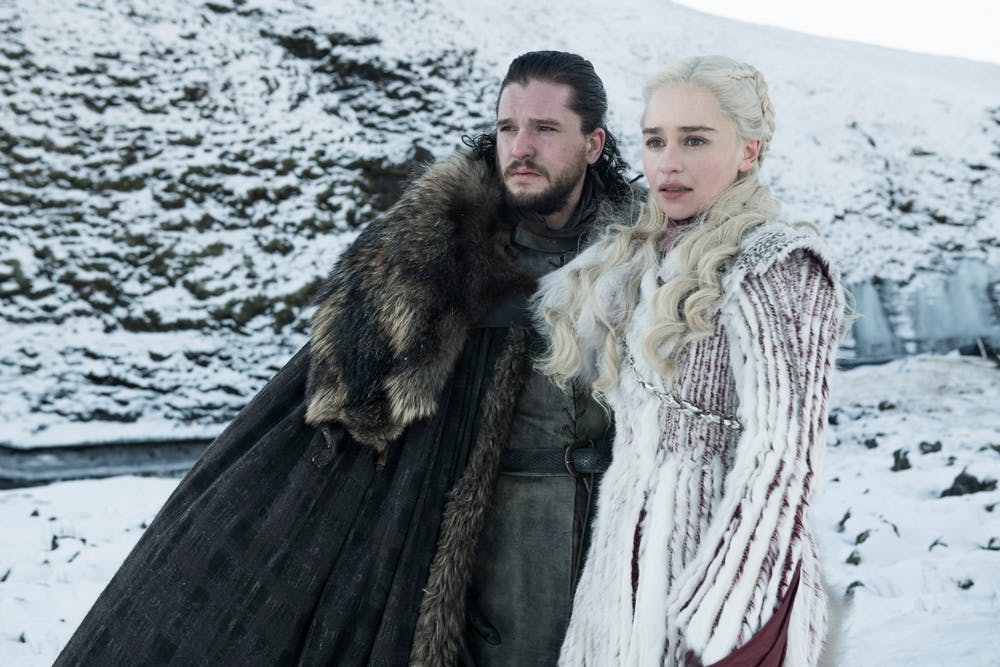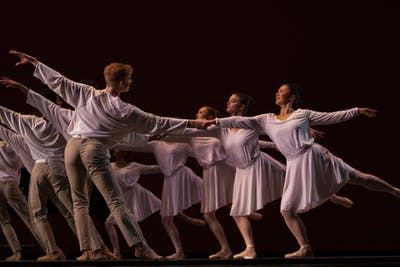
Jon Snow, played by Kit Harington, and Daenerys Targaryen, played by Emilia Clarke, stand alongside one another in a scene from “Game of Thrones.”
A year later, the eighth and final season of “Game of Thrones” is still fresh in my mind. As the credits rolled on the final episode last May, one thought kept bouncing around in my head: I wonder how this will age?
Would the ending I perceived as messy be one day hailed as the perfect conclusion? Would critics be looking at things in a different light? Would I?
I’m not sure about the critics. But from my point of view, the end of “Game of Thrones” isn’t any better in hindsight. It’s actually worse.
I remember driving back and forth to school in the spring of 2019, in part so I could work my weekend job at Walgreens, but also so I could watch the last six episodes of the fantasy behemoth with my family in Seymour, Indiana.
When I look back on it now, it feels like a waste of time. As each episode passed by, riddled with bad characterization, awful plotting and even worse lighting, I felt myself becoming disenchanted with the show I’d grown to adore. I drove back to Bloomington in the darkness of the early morning, feeling not only tired but let down.
If any other show had flopped towards the finale, it wouldn’t be such a big deal. But “Game of Thrones” wasn’t just any other show. It was a phenomenon. Its ratings were sky-high, with viewing numbers averaging around 32.8 million per episode by season seven. The show was so popular that it even inspired scientific studies.
Expectations were high. Perhaps they were so high that it would have been impossible for Thrones to meet them.
But the show’s executives didn’t even try. Even though HBO offered showrunners David Benioff and D.B. Weiss more episodes to wrap everything up, the season ended up clocking in at only six episodes.
The result was monstrous. The episodes felt rushed and messy. Fascinating characters such as the diabolical Queen Cersei Lannister were given very little screen time compared to previous seasons.
But the show’s greatest sin lies in the unraveling of Daenerys Targaryen. Previously portrayed as a heroic revolutionary, the beloved character ends up going to the dark side in the last two episodes. This development was completely out of character and stunningly unimaginative.
Throughout the course of the show, viewers watched as Daenerys suffered through horrors. We watched her triumph over her abusers and rise out of the ashes of pain to a place of power. She was not only powerful, but also compassionate.
At the beginning of season eight, she put aside her own ambitions and helped Jon Snow defeat the show’s infamous White Walkers. Because of her love for Jon and humankind as whole, she helped save the realm from the greatest threat it would ever face.
And then, a mere three episodes later, she torched King’s Landing to the ground, innocents and all. After seven seasons of building Daenerys up to be a hero, Benioff and Weiss decided that the most logical resolution for her character was to slip into insanity and rage.
Daenerys isn’t the only character the showrunners betrayed. Jaime Lannister’s arc was also handled horribly. After helping defeat the White Walkers alongside our heroes, he crawled back to his sister and their dysfunctional relationship.
The disappointing end to “Game of Thrones” can teach us a lot of things. It teaches us the importance of character and plot, as even the final season’s $90 million budget wasn’t enough to save the show from its larger narrative mistakes.
And it teaches us that even things that seem untouchably perfect are never too big to fail. “Game of Thrones” had the world watching as the last season came in, and it couldn’t deliver.
Perhaps we ought to learn to temper out expectations. Maybe “Game of Thrones” fans were, in the end, impossible to please. Nonetheless, after having a year to reflect on the show’s ending, I’m still left feeling disappointed and wondering how things could have turned out if only the showrunners had taken the time to properly set up and execute the show’s ambitious character arcs.
Molly Hayes (she/her) is a rising junior studying English. She plans to earn a Master of Library Science.
Like what you’re reading? Support independent, award-winning college journalism on this site. Donate here.




















![[Book Review] The Blade Itself (The First Law Trilogy) by Joe Abercrombie](https://bendthekneegot.com/wp-content/uploads/2018/01/1516047103_maxresdefault-218x150.jpg)























